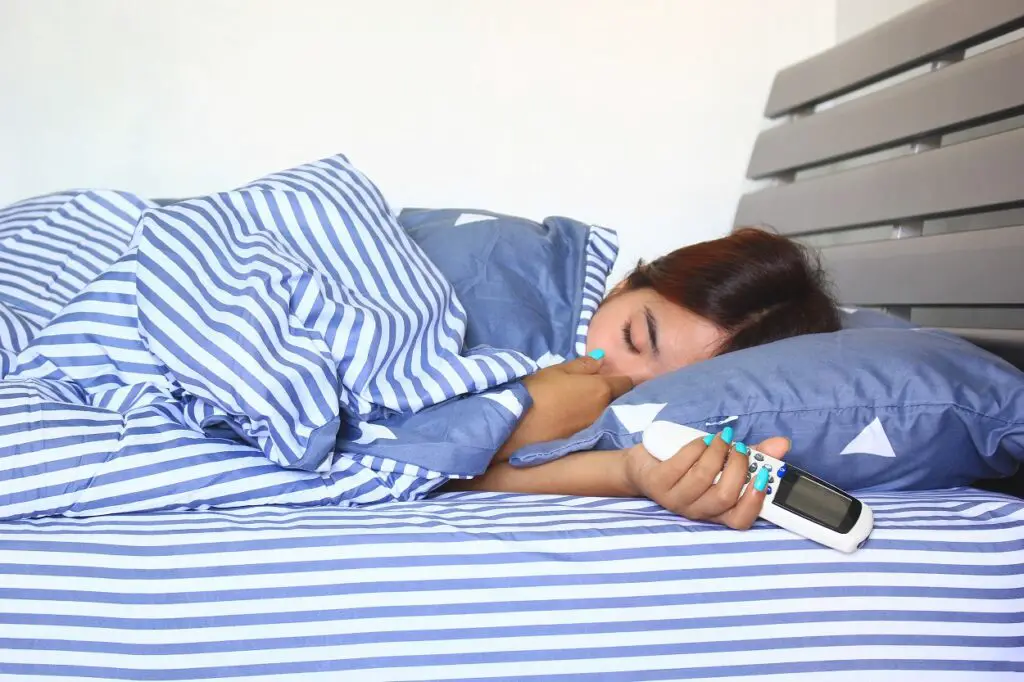Have you given much thought to the temperature of the room you sleep in and how it might affect your health? Have you considered how sleeping in a cold room or a hot room at night can affect how you feel the next day? If not, you might find it interesting to learn about the effects of sleeping in a cold room.
Is it good to sleep in a ice cold room? I want to dive into this question and look at some of the effects of the temperature of your bedroom.
Are You Comfortable in Your Bedroom
If you want healthy, refreshing, effective sleep, you should sleep in a room that’s comfortable for you. That means the room is one you’re not afraid to sleep in because it’s familiar to you. It also means that you have lights and sounds eliminated as much as possible so you can get restful sleep. It also means that the temperature of the room is comfortable for you.
What happens if the temperature is off and you don’t feel comfortable during the night because it’s too hot or too cold? If the room is uncomfortable for you, you may toss and turn throughout the night. Even if you don’t wake up fully, you probably won’t get a very restful sleep. That means you’ll feel tired, grouchy, and irritable the next day.
You’re probably more likely to toss and turn during the night if you’re too hot rather than too cold. It’s also an easier fix to sleep in a cold room than a hot room and make yourself comfortable. You can simply pull some extra covers or blankets over you to warm yourself up without having to change the temperature of the cold room.
It is important that you stay comfortable while you sleep, though. Otherwise, you’re probably not going to get a very restful sleep and you may wake up feeling tired and lethargic.
The Benefits of Sleeping in a Cold Room
Why is it good to sleep in a cold room? There are actually quite a few benefits, and I want to share some of those with you.
When it is time to sleep, your body cools down. Your body temperature will lower, which tells your brain it’s time to go to sleep.
Sleeping in a colder room helps you achieve that lower body temperature faster, ensuring you fall asleep quicker. If you want to get more value out of your bedtime and spend less time lying awake, sleeping in a colder room could be the solution.
Is it good to sleep in a cold room? It might be helpful for people who are insomniacs or who otherwise have trouble sleeping. Try it out if you spend a lot of time trying to go to sleep at night.
Another benefit to sleeping in a cold room is that you can lower your risk of disease. If you’re falling asleep faster and getting restful, deeper sleep, you’re helping your body out in a lot of ways.
You’ll be improving your circadian rhythm, lowering blood pressure, reducing stress on your heart, and reducing your risk of heart disease.
You can enjoy a better quality sleep as well when you sleep in a cold room. Your body temperature will rise when you start to wake up, so keeping it cool ensures that you sleep more soundly throughout the night. That means you’re getting more value out of whatever limited sleeping hours you may have available to you.
If you are someone who struggles to get enough sleep and may not have much time to sleep, and sleeping in a cold room can improve the quality of your sleep.
One of the other benefits I want to tell you about is how sleeping in a cold room can boost your mood. If you’re getting plenty of good sleep, you’re less likely to be irritable. It’s easier to get your mood under control and have level, even emotions. You’re less likely to go up and down emotionally and less likely to fly off the handle. You’re more likely to stay positive and less at risk for depression.
These incredible emotional benefits are definitely worth taking into consideration as you try to decide on whether you should sleep in a cool room or not.
Is It Good to Sleep in a Cool Room when Having a Cold
I’ve talked about how a cold room can help you in different ways and why it might be a good idea, but it’s not always the best idea. If you have a cold, you probably don’t want to sleep in a cold room.
You will want to sleep comfortably when you have a cold, but it’s a good idea to raise the temperature a little bit in your bedroom if you’re used to sleeping in a cold room. When you’re fighting a cold, your body is weak and susceptible to health complications. You may make it difficult for your body to recover and for your immune system to fight the infection effectively if you sleep in a cold room.
Is it good to sleep in a cool room when you have a cold? I wouldn’t recommend it, and you may figure out for yourself that it’s a bad idea once you start sneezing, coughing, or feeling congested because of the coldness.
If you tend to sleep with a fan pointed towards you, you may want to turn it away from you when you have a cold. This can help to alleviate some of the symptoms, as direct airflow on you can make your symptoms worse. Direct cold air on you can agitate the effects of the cold, triggering your symptoms and causing you to recover slower.
Sleeping in a cold room can be very beneficial for you, as I’ve covered above. However, it’s best to raise the temperature a little when you have a cold. You don’t want to be so cold during the night that you start to shiver, and raising the temperature a little can help speed your recovery. You want to give your body any help you can in fighting off the infection and recovering from the illness as quickly as possible.
Once you’re recovered from your sickness, you can turn the temperature back down and enjoy all those benefits that come from sleeping in a cold room.
Is It Better to Sleep In a Warm Room
If you’re used to sleeping in a warm room, you may find it difficult to transition to a cold room. All the benefits I’ve covered may be enticing, but you may find some trouble in changing up the way you sleep.
It may help to add some extra covers to your bed and to go slowly in changing the temperature from warm to cold. Try changing the temperature just a few degrees at first, and once that’s comfortable for you, you can change it a few more.
Also keep in mind that the room doesn’t need to be so cold that you shiver during the night. Be careful about how low you keep the temperature, as that can actually prevent you from getting restful sleep.
There are other ways to keep your room cooler than just change the temperature. You can also use blackout curtains that keep sunlight out of the room and cool the room down during the day. You may also want to keep windows closed during the hottest part of the day. This way, hot air from the outside won’t come in and get trapped in your bedroom.
Keep in mind that heat rises, so the lower your bed is to the floor and the lower your bedroom is in the house, the cooler the room will be naturally.
My name is Ellis Francis and I have been a personal fitness trainer, sports nutritionalist and health and fitness advisor for over 25 years. I am the lead health and fitness advisor at https://awellnessbody.com.







